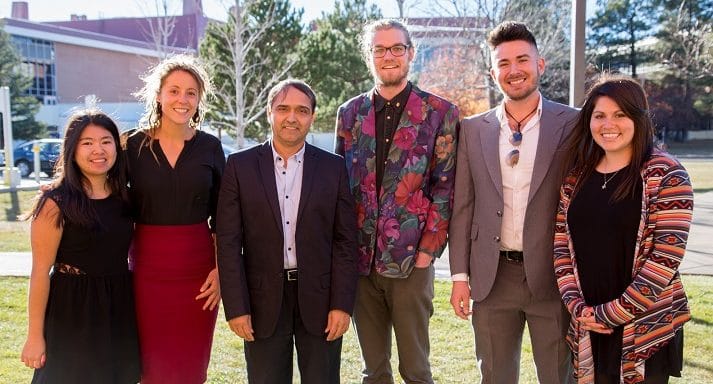A global perspective

The Department of Global Languages and Cultures offers communicative competence and cultural awareness in various languages – Chinese, French, German, Italian, Japanese, Navajo, and Spanish.
Approximately 25 full-time faculty, along with adjunct faculty and graduate assistants, teach elementary, intermediate, and advanced level courses to approximately 2,000 students per semester. Students have access to the Global Engagement Language Learning center, a state-of-the-art computer, video, and audio center.
We offer programs in Chinese, French, German, Italian, Japanese, Navajo, and Spanish. Special offerings include language pedagogy, intensive study courses, Native American language and culture, as well as study abroad and direct exchange programs.
Already proficient?
If you are already proficient in one of the languages we offer, check out these options for earning credit and/or skipping introductory classes:
- Credit-by-Exam
- Retrocredit
- Spanish Placement Exam (Enrollment Only)
Mission Statement Accordion Closed
The Department of Global Languages and Cultures is committed to providing an educational experience that allows undergraduate and graduate students to understand the world’s peoples and their diversity. This includes contributing to the formation of global citizens able to participate in local, national, and international communities and environments. Through linguistic, literary, and cultural approaches to the study of languages in its major programs (French, German, Spanish) and other language offerings (Chinese, Italian, Japanese, Navajo), the department strives to help students: a) develop skills in five areas of language study: speaking, listening, reading, writing, culture; b) develop cognitive skills in critical thinking, analysis; and c) learn about the nature of global engagement, diversity, and sustainability, and critically reflect upon the differences in the ways they manifest themselves in the United States and abroad.
Through its Interdisciplinary Global Programs (IGP) with emphases in French, German, and Spanish, the Department of Global Languages and Cultures has developed key partnerships with and connections to STEM fields, Business, and International Affairs as a response to the need for students in these varied disciplines to effectively communicate across borders and cultures. Interdepartmental IGP collaborations also include the study of Chinese or Japanese.
In recognition of the growing Spanish-speaking populations throughout the United States, the Department offers coursework integrating an appreciation of Latinx cultural heritage and identity with the study of linguistics and literature. Our location in Arizona further inspires us to focus on the conditions and concerns unique to the Borderlands of the American Southwest. Similarly, NAU’s commitment to Native Americans and its distinctive geographic position in the Southwest are reflected in our Navajo program and its course offerings, which emphasize history, cultural tradition, and linguistic preservation.
The Department prepares the region’s future language teachers in language proficiency and in instructional methodology, and equips students to compete for career opportunities in education, government, business, STEM fields, and the private sector, both domestically and globally. In order to optimize and enhance instruction as well as to create opportunities for learning outside the classroom, we offer students experiential learning opportunities such as immersion classes, international internships, study-abroad programs, and extracurricular activities, as well as technology-assisted foreign-language learning.
The Role of the Faculty Accordion Closed
The faculty of the Department of Global Languages and Cultures is committed to a balanced program of teaching, research, and service. Faculty pursue an active research agenda that involves the generation and dissemination of new ideas and information in their fields of expertise at the regional, national, and international levels. Research not only fosters faculty intellectual growth but also plays a key role in enhancing the quality of instruction. Faculty members serve as role models and mentors for students throughout the university and actively engage in professional service roles by organizing student-oriented activities that contribute to the university and community life.
